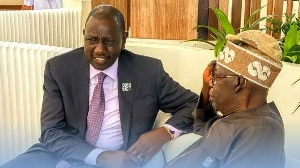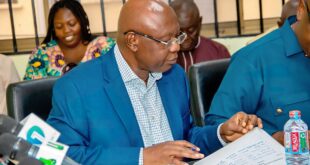Since Kenya’s William Ruto and Nigeria’s Bola Tinubu became presidents, they have faced similar criticism over their frequent trips abroad.
The two men have been the subject of unflattering descriptions – the costs associated with their alleged penchant for air travel often contrasted with tough economic conditions at home.
A Kenyan newspaper, the Standard, nicknamed Mr Ruto the “Flying President”. It said “so great is his love for flying that it appears that he cannot pass up any opportunity” despite pressing domestic demands, such as dealing with the high cost of living.
Last month, as Mr Tinubu made yet another trip to Europe, Nigeria’s opposition leader Atiku Abubakar said on social media that Nigeria does not need a “tourist-in-chief”. He criticised the president’s private visit “while Nigeria is drowning in the ocean of insecurity”.
This in some ways can be seen as a cheap shot, easily levelled by any critic. Presidents need to attend heads-of-state meetings and nurture foreign relations. This is important not only for diplomatic reasons, but also economic ones, as lucrative investment deals can be negotiated.
But some have pointed out that late Tanzanian President John Magufuli never travelled outside Africa in his six years in office.
‘Personal glorification’
Kenyan foreign policy analyst Prof Macharia Munene acknowledges that some trips are necessary but says others are undoubtedly “wasteful”.
“You have presidents who love to be in the air… Some of these trips are personal glorifications, not so much for the country,” he told the BBC.
Mr Ruto and Mr Tinubu and their spokespeople defend their trips as being vital to help address the very problems they are accused of ignoring.
In the eight months since his inauguration, Mr Tinubu has made 14 trips – an average of just under two a month – but this is dwarfed by Mr Ruto, who has made about 50 journeys abroad since he became president in 2022 – averaging more than three a month.
In comparison, Mr Ruto’s predecessor, Uhuru Kenyatta, averaged just over one foreign trip a month in his decade in charge, similar to the record of Nigeria’s previous president, Muhammadu Buhari, although in terms of total days spent abroad, the difference is not that much.
Other world leaders have also notched up the air miles, but Mr Ruto and Mr Tinubu face continued questions over whether every trip is necessary.
The Nigerian and Kenyan leaders were both in Europe at the end of last month – Mr Ruto in Italy attending the Italy-Africa summit while Mr Tinubu was continuing his unexplained “private visit” to France, the third time he has been in the country since last May. Since then, Mr Ruto has been on other trips.
In June 2023, just three weeks after assuming office, Mr Tinubu travelled to Paris for a two-day climate summit. He had already been there months earlier “to rest” and plan the transition shortly after being elected president.
From Paris he went on to the UK for private talks with his predecessor, who had also travelled to “rest” after the elections. A week later, Mr Tinubu went to Guinea-Bissau for a meeting of West African bloc Ecowas, followed by a trip to Nairobi.
In August he visited Benin, and in September India, the United Arab Emirates and the US for the UN General Assembly before returning to Paris.
He was home for the whole of October before resuming travels with a trip to Saudi Arabia, then Guinea-Bissau and Germany at the end of November and a week later travelled to Dubai.
The Nigerian presidency has said the trips are important for attracting foreign investment.
“On every foreign trip I have embarked on, my message to investors and other business people has been the same. Nigeria is ready and open for business,” President Tinubu said in his 2024 New Year message.
Mr Ruto’s travel schedule since his inauguration in 2022 has been even more hectic.
Between September of that year and last December he had travelled abroad at least twice every month. In May 2023 he made five trips. He has travelled to various African countries, Europe and the US for global events and bilateral meetings.
This year, in January, he has been in Uganda, the Democratic Republic of Congo and Italy. And already this month, Mr Ruto has been to Japan and the UAE.
There is not just the question of frequency, but also the question of cost.
Mr Tinubu is said to have spent at least 3.4bn naira ($2.2m; £1.8m) on domestic and foreign travel in the first six months of his presidency – 36% more than the budgeted amount for 2023, the Nigerian newspaper Punch reported, citing GovSpend, a civic tech platform that tracks government spending.
In Kenya, the Controller of Budget, an independent office that oversees government spending, showed a significant increase in the office of the president’s travel expenditure in the year to July last year – which included nine months of Mr Ruto’s presidency.
Overall spending for both domestic and foreign travel for the year was over 1.3bn Kenyan shillings ($9.2m; £7.3m), exceeding the travel budget for the previous year by more than 30%.
The Kenyan government spokesman did not respond to the BBC’s questions about Mr Ruto’s trips, though the president and the spokesman have often justified them.
Mr Ruto himself has said he does not “travel like a tourist” and the trips are necessary to get foreign investment and create employment for Kenyans abroad – he recently said he had secured more than 300,000 job opportunities through negotiations.
After the recent trip to Japan, Mr Ruto said he had secured deals worth more than $2.3bn.
While stressing the benefits of the presidential trips, both Nigeria and Kenya have also taken some action to counter the criticism of government employees travelling abroad.
Kenya said it had cut its civil service travel budget by 50% in the wake of accusations of “wastage” on domestic and foreign trips. But this does not seem to have affected the president himself, who has said he will not shun trips as long as they are beneficial.
Last month, the Nigerian president announced a reduction in the official travel delegation by about 60%. The directive announced by his spokesman Ajuri Ngelale included cutting down the president’s own travel entourage, but did not say whether he would cut the number of his trips.
Yet is not just Kenya and Nigeria where the cost of travel has been a concern.
As Congolese citizens prepared to go the polls last year, one of the criticisms of President Félix Tshisekedi was the number of trips he had made, with allegations that there was little to show for it.
Last November, Malawian President Lazarus Chakwera suspended all international travel for himself and his ministers, and ordered all those abroad to return due to the economic problems the country was facing.
Some other countries that have also had to address travel spending by government officials since last year include Uganda, The Gambia, Namibia and Sierra Leone, with the leaders of the latter two labelled by local newspapers the “flying president” – just like Kenya’s Mr Ruto.
Source: bbc.com
 Home Of Ghana News Ghana News, Entertainment And More
Home Of Ghana News Ghana News, Entertainment And More





